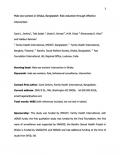Publications - Released in 2003
Male sex workers (MSWs) comprise an important group at risk of HIV infection in South Asia. There are few published studies about their HIV or STD prevalence, numbers, socio-demographic characteristics or risk behaviors, although there is a growing literature on the more general category of men who have sex with men (MSM) in South Asia. Most published studies are concerned with describing behavioural risk and issues of identity and gender, but we have found none that evaluates or describes HIV prevention interventions. In Bangladesh, however, considerable progress has been made in research, prevention, HIV/syphilis and behavioral surveillance surveys (BSS) among MSM in general and among MSWs in particular. BSS are repeated quantitative surveys carried out in specific populations to track changes in the frequency of behavioural risk factors associated with the spread of HIV infection. The methodology of BSS is semi-standardized and allows comparison across countries and between samples within a country. Probability sampling, once established in sentinel populations, permits comparisons across years and can examine the effects of exposure to an intervention or to a package of interventions in a particular location.
Data from the Bangladesh behavioural surveillance demonstrate the impact of a behavioural intervention on MSWs in Dhaka. Nonetheless, overall condom use remains low. MSWs in Bangladesh remain at high risk in an environment with high levels of syphilis, but continuing low HIV prevalence.
This paper presents selected results of several studies on MSWs in Dhaka, Bangladesh conducted between 1998 and 2000.
Downloads
Organizations
- FHI 360 (Family Health International)






